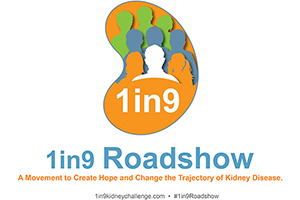
A Phoenix couple touring the country on behalf of sufferers of advanced kidney disease made a stop in Tucson earlier this month to meet with faculty and investigators within the UA Division of Nephrology and the Arizona Kidney and Vascular Research Center.
They offer a patient perspective on kidney failure, the lifeline of hemodialysis treatment and the importance of quality of life.
 Raymond and Analyn Scott are founders of the 1in9 Kidney Challenge, a “movement to create hope and change the trajectory of kidney disease.” Their organization is named for the fact that one in nine American adults—or about 20 million people—has chronic kidney disease (CKD). They meet with dialysis patients and medical professionals regularly to talk about the patient perspective and promote home dialysis where possible as a way to maintain a healthier quality of life for the patient and their families. They visited UA kidney doctors and researchers at the BIO5 Institute on May 4.
Raymond and Analyn Scott are founders of the 1in9 Kidney Challenge, a “movement to create hope and change the trajectory of kidney disease.” Their organization is named for the fact that one in nine American adults—or about 20 million people—has chronic kidney disease (CKD). They meet with dialysis patients and medical professionals regularly to talk about the patient perspective and promote home dialysis where possible as a way to maintain a healthier quality of life for the patient and their families. They visited UA kidney doctors and researchers at the BIO5 Institute on May 4.
A native of Charleston, S.C., who served in the U.S. Army, Raymond has been on dialysis virtually non-stop since his kidneys failed at age 29 due to high blood pressure. His brother donated a kidney to him, but his body rejected it four years later. At age 39, he underwent emergency open-heart surgery due to a dissecting aorta caused by prolonged high blood pressure. For more than two years, his wife has been administering hemodialysis treatments for her husband at home—and on the road.
The couple spend a lot of time traveling by RV—including a 25-day, 6,263-mile winter/spring 2017 tour that took them from Dallas to Nashville to Atlanta to Charleston to Charlotte/Winston-Salem, Washington, DC, Baltimore, Philadelphia, New York City, Cleveland, Chicago, St. Louis, Tulsa and Albuquerque. Along the way, they visit with physicians, researchers, patients, public officials and advocacy groups to promote advances in kidney care and options to improve quality of life for those suffering from CKD.
In Tucson, they serve on a patient advisory Council established by Division of Nephrology Chief Prabir Roy-Chaudhury, MD, PhD, who also is national co-chair of the Kidney Health Initiative—a public private partnership between the American Society of Nephrology and U.S. Food and Drug Administration to develop and move therapies and devices for CKD patients more quickly from bench to bedside.
During their recent visit to UA, the couple listened to research presentations by Dr. Roy-Chaudhury’s team. They also met with researcher and laboratory manager Diego Celdran Bonafonte, DVM, PhD, and Frank C. Brosius, MD, and Bijin Thajudeen, MD, from the Division of Nephrology. Afterward, they toured the Arizona Kidney and Vascular Center at the BIO5 Institute and discussed future collaborative opportunities between 1in9 Kidney Challenge and the UA.
Today, kidney disease is the ninth leading cause of death in the United States. According to the National Institute of Diabetes and Digestive and Kidney Diseases, a unit of the National Institutes of Health, the five-year survival rate for dialysis patients is 34.8 percent compared to a similar survival rate of 85.5 percent for transplant patients.
But the Scotts, whose home dialysis regimen allows them to travel unhindered by the absolute need to stay near a dialysis center, are testimony to the fact that—if you are unable to get a transplant—home dialysis allows you to achieve a good quality of life.
“When someone finds out he has kidney disease, they look at us like, ‘I’m sorry’—as if he’s going to die,” Analyn Scott said. “But within three days of starting to dialyze at home, he noticed a difference. It was less draining.”
“If I’d have thought that way, we wouldn’t have a 12-year-old son,” Scott said. “More people die of kidney disease than heart disease or cancer. Why isn’t that more in the press. For me, you I think about it in terms of longevity—do I want to walk my daughter down the aisle at her wedding?”
Both the Scotts look forward to advances in kidney care that focus in the near future on portable, wearable and implantable solutions—some of them potentially made from 3D printers—and longer term personalized medicine solutions such as stem cell therapies and devices that enable CKD sufferers to focus more on quality of life than simple survival.
Among physicians on the 1in9 Kidney Challenge’s Medical Advisory Board are Dr. Roy-Chaudhury and Zain Khalpey, MD, PhD, UA associate professor of surgery and surgical director of the Heart Transplants and Mechanical Circulatory Support Program and director of the Ex Vivo Lung Program and Cardio Pulmonary Stem Cell Biobank at Banner – University Medical Center Tucson.
EXTRA INFO
Raymond and Analyn Scott also gave an interview at ASN Kidney Week 2016, held Nov. 15-20 in Chicago, that was included in the KidneyNews newsmagazine podcasts for the annual conference of the American Society of Nephrology.
You can listen to that podcast here: https://player.fm/series/78222/178832985
For other items included in ASN KidneyNews podcasts, click here.
ALSO SEE:
“1in9 Kidney Awareness Documentary Visits Division of Nephrology” | Washington University School of Medicine in St. Louis, Posted April 4, 2017
“Living Well with Kidney Disease” | U.S. Department of Veterans Affairs, Posted March 27, 2017
“Giving and Leading: Kidney Disease Organization” | Arizona PBS at Arizona State University, Posted Feb. 8, 2016

